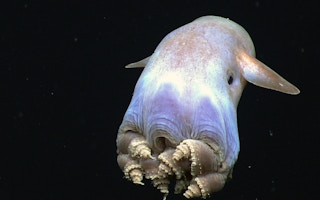Fiji, Palau and Samoa have become the first countries to oppose deep-sea mining in international waters.
To continue reading, subscribe to Eco‑Business.
There's something for everyone. We offer a range of subscription plans.
- Access our stories and receive our Insights Weekly newsletter with the free EB Member plan.
- Unlock unlimited access to our content and archive with EB Circle.
- Publish your content with EB Premium.
The three Pacific island countries formed an alliance against seabed mining on the sidelines of the United Nations Ocean Conference on Monday, in an event co-hosted by conservation groups Deep Sea Conservation Coalition and World Wide Fund for Nature (WWF).
Deep-sea extraction could go ahead on a commercial scale in international waters as soon as July next year once mining regulations are finalised, a prospect that alarms environmentalists.
The new Alliance of Countries for a Moratorium on Deep-sea Mining was announced by the President of Palau, Surangel Whipps, Jr., who said that seabed mining “compromises the integrity of our ocean habitat that supports marine biodiversity and contributes to mitigating the impacts of climate change”.
Fiji, Palau and Samoa are nations located near in a stretch of the Pacific known as the Clarion Clipperton Zone (CCZ), the region where large-scale industrial resource extraction is slated to go ahead. There are an estimated 21 billion tonnes of minerals in the CCZ that supporters of mining argue are critical to power the energy transition and fight climate change.
Palau’s announcement comes ahead of a series of meetings to be held in July and August by the International Seabed Authority (ISA), the United Nations-linked governing body for the seafloor, to develop and agree on regulations for mining the CCZ.
In July last year, the Pacific island of Nauru triggered an ISA rule that would allow seabed mining to go ahead within two years, with whatever rules are in place at that time.
Environmentalists argue that deep-sea mining could obliterate barely understood habitats, ruin fisheries and affect the oxygen-carrying capacity of the ocean. A study by 30 scientists, published in April, concluded that not enough is known about the environmental impacts of seabed mining for it to be permitted.
Arlo Hemphill, oceans project lead for campaign group Greenpeace, commented: “The wall of silence is finally being shattered as countries begin to speak out against the destructive deep sea mining industry, which would put the health of the ocean on which we all depend and the lives and livelihoods of billions of people living in coastal communities at risk.”
“The International Seabed Authority has been rushing headlong into this risky industry while ignoring its mandate to protect the oceans. Even stranger, it is preparing to join those who would be tearing up the ocean floor in search of minerals. The deep ocean, one of the world’s largest, most fragile, and important ecosystems, must remain off-limits to the mining industry,” he said.
News of the alliance emerges a week after United Kingdom-based Co-operative Bank became the seventh bank globally to implement a policy which excludes or restricts investment in deep sea mining. Credit Suisse ruled out financing deep-sea mining in April.
In April, the pacific island nation of Tuvalu rescinded its backing of a mining company planning to extract metal from the CCZ on environmental grounds. However, industrialised nations including Japan, China, France, United Kingdom, Germany, Belgium, South Korea, Russia, and Singapore are key supporters of deep-sea mining, which could generate US$150 trillion in gold deposits alone.
Papua New Guinea issued the world’s first commercial license in 2012, and was set to begin extraction in 2019. But the mining firm behind the venture, Nautilus Mineral Solwara, went into administration and the project folded at a loss of an estimated AUD$157 million to the PNG government.








